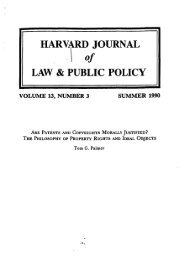G. A. Cohen on Self-Ownership, Property, and ... - Tom G. Palmer
G. A. Cohen on Self-Ownership, Property, and ... - Tom G. Palmer
G. A. Cohen on Self-Ownership, Property, and ... - Tom G. Palmer
Create successful ePaper yourself
Turn your PDF publications into a flip-book with our unique Google optimized e-Paper software.
<strong>Palmer</strong> <str<strong>on</strong>g>Cohen</str<strong>on</strong>g> <strong>on</strong> <strong>Property</strong> <strong>and</strong> Equality 243may be, but why must or should they be? Classical liberals <strong>and</strong> libertariansare open <strong>on</strong> the questi<strong>on</strong> of whether particular bits of l<strong>and</strong> orother resources should be c<strong>on</strong>sidered jointly or individually owned.15What is unatgued for by <str<strong>on</strong>g>Cohen</str<strong>on</strong>g> (aside fiom asserting that it is “intuitivelyrelevant”), but is of dubious plausibility, is the idea that everyresource other than our own pers<strong>on</strong>s should be c<strong>on</strong>sidered the jointproperty of all human beings, or perhaps of all rati<strong>on</strong>al agents. If rati<strong>on</strong>alagents were to be discovered <strong>on</strong> Mars, would the joint ownersof Earth be required to obtain the permissi<strong>on</strong> of every rati<strong>on</strong>al Martianbefore any terrestrial resource might be used, <strong>and</strong> would theagreement have to be unanimous across species? This would be astrange basis <strong>on</strong> which to build a theory of jurisdicti<strong>on</strong> over scarceresources. As almost all previous writers <strong>on</strong> property have emphasized,requiring the permissi<strong>on</strong> of every<strong>on</strong>e before any<strong>on</strong>e could pickan apple would result in the extincti<strong>on</strong> of humanity. Joint ownership. requiring unanimous approval to every act of transformati<strong>on</strong> of resourcesis ultimately rejected by <str<strong>on</strong>g>Cohen</str<strong>on</strong>g>, <strong>on</strong> the ground that it interfereswith any reas<strong>on</strong>able sense of aut<strong>on</strong>omy, but it is not clear why itshould even be entertained in the first place.There may be good reas<strong>on</strong>s to believe that very early in its actualhistory, property took <strong>on</strong>e of various forms of positive community,principally familial, as Fustel de Coulanges (1864), Maine (1888), <strong>and</strong>other anthropologists <strong>and</strong> historians of property have shown; but thatis not <str<strong>on</strong>g>Cohen</str<strong>on</strong>g>’s argument. Nor are the forms of positive communitydescribed by legal historians c<strong>on</strong>sistent with the egalitarian ownershipdescribed by <str<strong>on</strong>g>Cohen</str<strong>on</strong>g> as “joint ownership,” for they did not encompassall humans or all rati<strong>on</strong>al agena, but were always forms of communitythat established rights against all n<strong>on</strong>members ofthe owning communities.As Locke noted of comm<strong>on</strong> property, “And though it be comm<strong>on</strong>,in respect of some Men, it is not so to all Mankind, but is thejoint property of this Country, or this Parish” (Zuo nedises, 11.35). Inthis respect, “negative community~’ i.e., the idea that all have a rightto appropriabe unowned objects, is a far more egalitarian startingpoint than any form of “positive community,”which in every formever observed was a n<strong>on</strong>universal, group-limited right. This issue wascarefully c<strong>on</strong>sidered by the modern natural-law writers <strong>on</strong> property,who distinguished between negative community <strong>and</strong> positive community,the latter corresp<strong>on</strong>ding to the joint ownership that <str<strong>on</strong>g>Cohen</str<strong>on</strong>g>proposes as the pmper baseline.16It is remarkable that figures such as <str<strong>on</strong>g>Cohen</str<strong>on</strong>g> persistently overlook











